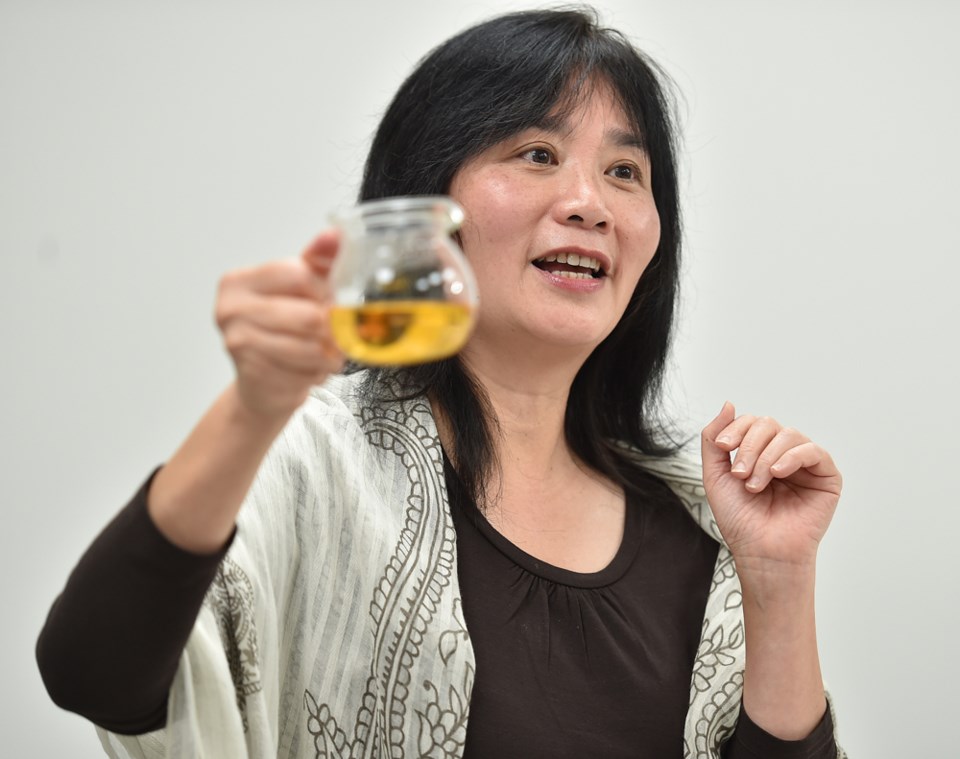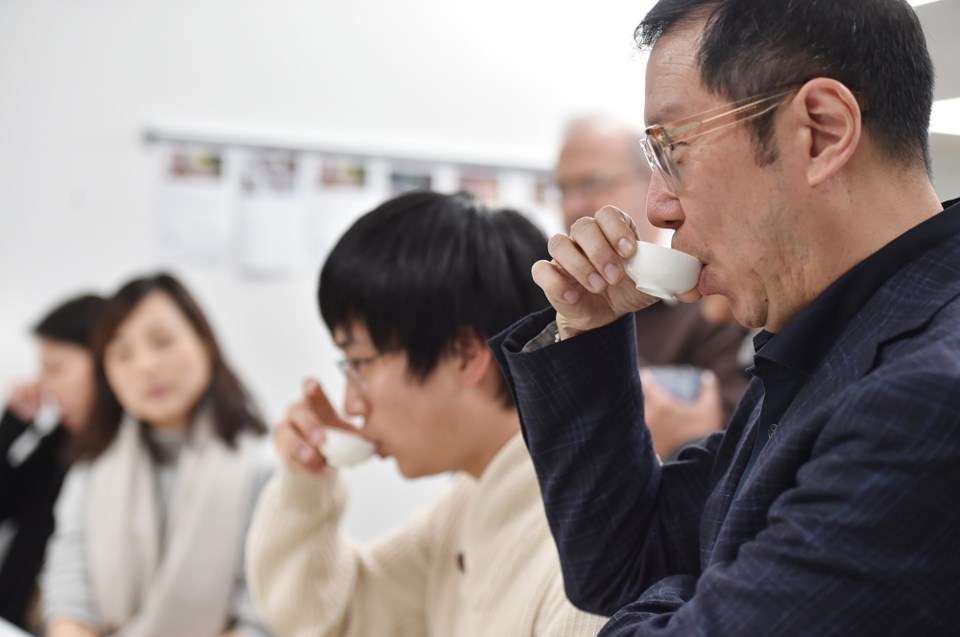It’s a Wednesday afternoon at the newly opened Chinatown House, and while the space buzzes with busy office energy Christine Wong talks tea.
In the small but bright kitchen space in the back corner of the office, she boils the water and chooses a small gold foil bag from a plate of different kinds of tea. She cuts open the bag and delicately unwraps the white paper inside to reveal a compact cluster of oolong tea leaves, a traditional Chinese tea.
“This is very beautiful. Sometimes I just look at the tea, appreciate it, take in the colour and aroma,” she says before placing the tea in the gaiwan, a tradition Chinese tea pot that resembles a bowl with a lid.
“It has a long history,” Wong says. “The Chinese use this kind of bowl for several hundred years. In the very beginning people use this gaiwan as a personal [tea] cup, but nowadays we just use it as a teapot.”
She readies her gaiwan and four tiny teacups by warming and rinsing each one with hot water.
Wong, who immigrated to Canada from Hong Kong in the late 1990s, is a certified tea master, and every Wednesday she hosts Tea Time at Chinatown House. It’s just one a several programs planned for the space aimed at sharing and celebrating not only Chinese traditions and heritage, but other cultures seen in the community.
Wong says she uses tea as a way to form connections with younger generations.

“It is very, very significant to make the bridge… This is my passion to do this kind of like intergenerational communication, but I need a tool… I think tea is one of the ways to do it. So I think it’s very important to connect the younger generation with our past to promote the culture,” she says, adding that it’s not just about promoting one country’s culture.
“Nowadays it’s a global village in the sense that Chinese culture does not belong to one country.”
Minna Van, executive director of West Coast Technology Innovation Foundation, the organization managing the space, echoed Wong’s sentiments.
“It’s called Chinatown House because we’re in Chinatown, but it’s meant to embrace Chinatown culture, which is everybody and everything that is Chinatown, it doesn’t mean just Chineseness,” she says.
Ěý
Multicultural club
While at its base, Chinatown House is a co-working and event space, it’s also meant to be a place to build and sustain the community through shared resources and programming — Wong’s tea workshops and Cantonese language lessons, a technology incubator and intergenerational cooking demonstrations.
“We’re looking to expand,” Van said. “We’re working with multiple groups right now to bring in cooking demos from different cultures. We’re working on Venezuela, Syria and First Nations… We’re hoping to do a lot more cooking demonstrations. Right now we’re working with the Hua Foundation, which does a lot of wonderful programs around food and food security. They’re doing the Food and Race program, so talking about privilege and race in relation to food.”
Other programs on the horizon include Create Chinatown, a monthly market featuring 15 vendors slated to start later this month, and a library.
“I think a lot of people want to know what Chinatown is and books specifically on Chinatown are really hard to find so we’re getting everybody in the space, because they all have their own personal collections, we’re going to create a library just on Chinatown as a resource library,” Van says.
Ěý
Co-working 3.0
Chinatown House is a different kind of co-working space — Van calls it a kind of a “co-working 3.0.”
“The idea of sharing a space and resources is still there, but we are adding more to that model with community impact programming, food and collaborative opportunities,” she said.
Van has been in the industry for more than a dozen years now and has seen how the idea of co-working spaces has changed. The foundation has a total of eight co-working spaces in the province.
“The first iteration of it is the executive office, where someone manages it and you come in and it’s very formal and there’s definite rules… the second version is where everyone is sharing — sharing space, sharing amenities and you want to create some synergy,” she said. “The third version of it is now people have understood the concept of shared space, but now they want to have shared vision to move each other along the path.”
It was founded by a group of entrepreneurs, urban designers, non-profit organizations and cultural curators with the aim of creating a new cultural hub in the community to encourage collaboration, dialogue and learning.
“This is like the collaborative model with everyone working together in partnership, and I think that model works better for us at this point because it allows our members from other locations to be able to participate and feel like they have ownership of the space and curate it and create that impact,” Van said.
Community collaboration
Chinatown House is currently home to the City of Vancouver’s Chinatown Transformation Team, UBC’s Asian Canadian and Asian Migration Studies, Hua Foundation, Chinatown Today, Â鶹´«Ă˝Ół»Computer Graphics Association, West Coast Technology Innovation Foundation and Tomo Spaces.
The organizations share resources and support each other’s work — however many were already collaborating on Chinatown-related issues.
“It acts as a hub that connects people who care about Chinatown and have innovative ideas,” said Helen Ma, senior planner with the Chinatown Transformation Team.
The team was formed earlier this year and tasked with working with the community to foster living heritage and culture in Chinatown, as well as preparing a cultural heritage asset management plan. It is made up of six bilingual planners from a variety of backgrounds — social, cultural, heritage and community planning.
“This plan will be built on a partnership model because it will take everyone working together to take actions to achieve the goal,” Ma says. “This plan will also serve as the foundation document for a possible future UNESCO World Heritage site designation, which can be an additional honour to the community if achieved.”
Van says bringing together organizations from a variety of sectors was intentional.
“We wanted to make sure that there’s a mix of for-profit, non-profit and government and academia because we find that there’s so much disjointedness when it comes to policy making and implementing a lot of policies that sometimes doesn’t make sense for the community so it would be nice to have this sort of collaborations.”
Ma and other members of the Chinatown Transformation Team recently took some time out of their busy schedule to take Wong’s Tea Time workshop.
“Tea has a wonderful way of bringing people together,” she says. “We are excited to see how this format can be an innovative way for us to engage the community, including seniors, youth, businesses and other groups. We would like to see more programs like that in the community for sure.”
ĚýChinatown House also has an area for people looking for a temporary work space.
“If people just need a couple days, couple hours and they want to work on anything, or just get away from home and hang out in Chinatown, this is what they can do,” Van says.
Van says so far Chinatown House has been welcomed by many in the community.
“It was actually really encouraging because some of the elders have said this is what we’ve wanted to do for so long, get everyone together because there’s a lot of division on what Chinatown is and could be but people haven’t been brought together so they’re in the same space to discuss that,” she says.
“And then for the younger people who don’t’ quite have a clear idea of the language, the heritage, things like the cooking demonstration, the Cantonese class, the tea master ceremony, the food and race program, Create Chinatown, we’re hoping to bring all that in to pull people in and say this is how you can explore your culture and other people’s culture.”
For more information about Chinatown House visit chinatownhouse.ca.
@JessicaEKerr



